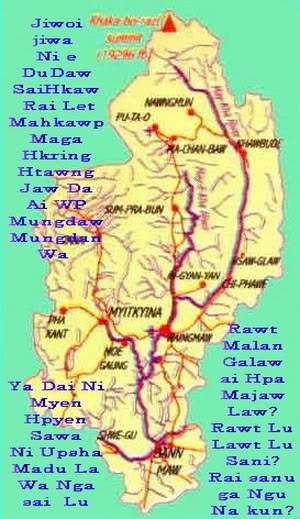By KYAW ZWA MOE
Burma's election date has finally been announced and constituencies have been designated. So, what has actually changed.? The blunt answer to that question is that everything is screwed up.
“Multiparty general elections for the country's parliament will be held on Sunday Nov. 7,” announced the Election Commission last Thursday. Interestingly, one week later, on Saturday Nov. 13, pro-democracy leader Aung San Suu Kyi is due to be released after her latest, 18-month term of house arrest.
Suu Kyi, who has spent 15 years of the past 20 years as a prisoner in her own home, is likely to be released if the election goes as planned by the generals. If junta leader Than Shwe still feels insecure about freeing her so close to the election he will probably find some trumped up excuse to keep her detained—perhaps along the lines of the stage-managed trial she endured after an American trespassed on her lakeside property. So, whether or not the 65-year-old Nobel laureate will be freed is still a big open question.
How about the current pre-election situation? More than 40 political parties listed to contest the upcoming elections were already aware before they officially registered that they will definitely be harassed or abused by the government, the Election Commission, local authorities and now the USDP. But what they are facing now is worse than expected.
Harassment, intimidation, dirty campaigning by the USDP, and heavy censorship of election-related news are rampant throughout Burma.
The chairman of the Union Democracy Party, Phyo Min Thein, recently resigned after deciding that things would not get any better, as he had hoped when he formed the party a few months ago.
The 41-year-old former student activist who spent 15 years in prison from 1990 to 2005 could see no light at the end of Burma's dark road to democracy.
“I had hoped that there would be a new order with the emergence of political parties, entities and multi-social classes, which would help to march toward democracy, and of course, that will also gradually help to bring us to a new democratic nation,” Phyo Min Thein told The Irrawaddy in an interview shortly after his resignation. “I simply expected there to be that sort of political arena. That's why I decided to take part in the election.”
It's likely that many of the leaders of the currently registered parties shared Phyo Min Thein's hopes when they formed their parties after March this year. Most didn't like the junta's 2008 Constitution, especially the fact that the military will have an automatic 25 percent of the seats in the parliament, but they decided to contest the elections for the rest of the seats (330 seats out of 440 in the People's Assembly) in the hope that the election would be relatively fair.
Now many of them are probably having second thoughts. Phyo Min Thein correctly said that the USDP's actions, supported by the military government, has created an election playing field that is far from free and fair. The USDP is determined to win as many of the other 330 seats as it can. Phyo Min Thein said opposition and ethnic parties would win a fair portion of those seats, if the election were fair.
According to the junta's election laws, parties can not campaign officially at this time. But the USDP has been aggressively campaigning in towns across the country: giving out low-interest loans to farmers; coercing people to become party members; indirectly threatening civil servants to vote for the party; buying votes with incentives like constructing or repairing roads in some communities, and offering incentives to businessmen.
In some townships of Irrawaddy Division, the USDP even tried to win votes for the party by allowing businessmen to operate illegal enterprises such as gambling, lotteries, so-called massage parlors and other shady operations, according to local sources.
In the face of such abuse, Phyo Min Thein decided to walk away from the election.
Perhaps in a sign of what's to come, the Democratic Party, led by veteran politician Thu Wai, sent a letter of complaint to the Union Election Commission in Naypyidaw, saying members of the party had been intimidated by security personnel. Ironically, even more intimidation followed.
Aug 17, 2010
Subscribe to:
Post Comments (Atom)
WUNPAWNG MUNGDAN SHANGLAWT HPUNG A NINGGAWN MUNGMASA
WUNPAWNG MUNGDAN SHANGLAWT HPUNG A NINGGAWN MUNGMASA
CHYE JU KABA SAI
Sa Du N'Gun Jaw La ai Majaw N'chying wa Chyeju Dum Ga ai,Yawng a Ntsa Wa Karai Kasang Kaw na N'Htum N'Wai ai Shaman Chye ju Tut e Hkam La Lu Nga mu Ga law




No comments:
Post a Comment